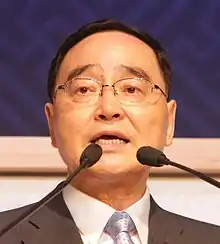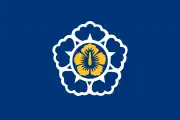Chung Hong-won
Jung Hong-won[1] (Korean: 정홍원; born 9 October 1944[2]) is a former Prime Minister of South Korea. He served from 26 February 2013[3] to 16 February 2015 under conservative President Park Geun-hye. Jung was a member of the Saenuri Party.
Jung Hong-won | |
|---|---|
정홍원 | |
 | |
| 38th Prime Minister of South Korea | |
| In office 26 February 2013 – 16 February 2015 | |
| President | Park Geun-hye |
| Preceded by | Kim Hwang-sik |
| Succeeded by | Lee Wan-koo |
| Personal details | |
| Born | 9 October 1944 Kato County, Korea (now Hadong County, South Korea) |
| Political party | Saenuri Party |
| Alma mater | Sungkyunkwan University |
| Chung Hong-won | |
| Hangul | |
|---|---|
| Hanja | |
| Revised Romanization | Jeong Hong-won |
| McCune–Reischauer | Chŏng Hongwŏn |
Early life and education
Jung graduated with a Bachelor of Laws (undergraduate) from Sungkyunkwan University. After passing the Judicial Examination,[5] he became a prosecutor.
Career
Jung became known after solving several high-profile cases, such as the Lee-Chang scandal, in which relatives of President Chun Doo-hwan were prosecuted, and the Walker Hill Casino scandal.
Jung resigned from his job as a prosecutor in 2003 and then served the president of the Institute of Justice.[6] From 2004 to 2006, he served as the Standing Commissioner of the Republic of Korea National Election Commission.[7] From 2008 to 2011, he served as the president of Korea Legal Aid Corporation.[8]
Before the 2012 general election, he entered the Saenuri Party. On 8 February 2013, he was nominated as the first Prime Minister of President-elect Park Geun-hye's government. On 26 February 2013, after the National Assembly of South Korea confirmed his nomination, he was formally sworn in. On 27 April 2014, he tendered his prime ministership resignation to the president following the Sinking of the MV Sewol on 16 April 2014, during which more than 300 people were killed.[3] President Park accepted the resignation in principle, but Jung continued to lead the Cabinet after the search and rescue operations of the Sewol came to an end.[9] Few were nominated to replace Jung, including Ahn Dae-hee, but none of them were able to replace him.
Jung was formally replaced as prime minister on 16 February 2015.[10]
References
- Former Prime Ministers
- 종합 경제정보 미디어 이데일리 - 상업적 무단전재 & 재배포 금지 (2005-10-25). ▒이데일리-세상을 올바르게,세상을 따뜻하게▒. Edaily.co.kr. Retrieved 2014-04-27.
- "South Korean prime minister resigns over ferry disaster response - CNN.com". Edition.cnn.com. 26 April 2014. Retrieved 2014-04-27.
- [프로필]정홍원 국무총리 후보자 : 네이버 뉴스 (in Korean). News.naver.com. 2013-02-08. Retrieved 2014-04-27.
- 법무연수원 사이버교육센터. Archived from the original on 2014-05-01. Retrieved 2014-04-30.
- 역대상임위원(글 읽기)<상임위원소개<위원장 및 위원<위원회안내< 중앙선거관리위원회
- 공단소개>기관장>역대이사장
- Park to stick to current Cabinet for June polls
- (LEAD) Parliament endorses PM nominee

